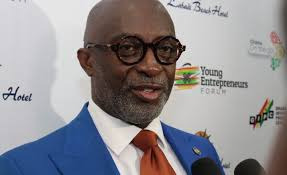Special topics
 CEO of the Ghana Investments Promotion Centre (GIPC), Yofi Grant, has confirmed the entrance of international oil giant Exxon Mobil in the country’s oil and gas industry.
CEO of the Ghana Investments Promotion Centre (GIPC), Yofi Grant, has confirmed the entrance of international oil giant Exxon Mobil in the country’s oil and gas industry.
The company showed initial interest in the country’s sector when it wanted to take up Kosmos energy but failed.
Yofi Grant in an interview with JoyBusiness said Exxon Mobil and other international oil companies have now invested in the exploration of Ghana’s hydrocarbon development.
Exxon Mobile is expected to sign a petroleum agreement with the government and GNPC next week to exploit petroleum resources in the offshore deepwater cape three points.
According to research, the company is touted as the world’s largest integrated international oil company with daily production of about 4 million barrels of oil equivalent (BOE) and with revenue stream worth $218.6 billion as of 2016.
In 2015, the company signed a Memorandum of Understanding with Ghana to assess its Deep-water Cape Three Point (DCTP) region.
This region is a hundred miles off the coast with water depth ranging between 2,000 and 4,000 metres – according to a release from the Energy Ministry.
The government said two firms had cautioned that the exploration of the field was risky because of its depth.
But now, government has considered the Exxon Mobil bid vital, given the firm’s experience and capability in deep-water operations.
Impact on FDIs
Mr Grant said this move, when operationalized, would mean an increase in Foreign Direct Investments (FDIs) for the country – a situation that could go a long way to make the GIPC exceed its target.
Employment
The GIPC boss says the company’s participation in Ghana will open up more job opportunities for Ghanaians in the oil and gas sector.
He says, “the interesting thing though is that there is a worry when foreign direct investors come in; they come and they don’t engage indigenous people.
“But I experienced and our research is telling us that a lot of the Foreign Direct Investors, who come into Ghana, actually would prefer to even employ Ghanaians than they want to employ expatriates. This is because it is expensive when they want to employ expatriates.”